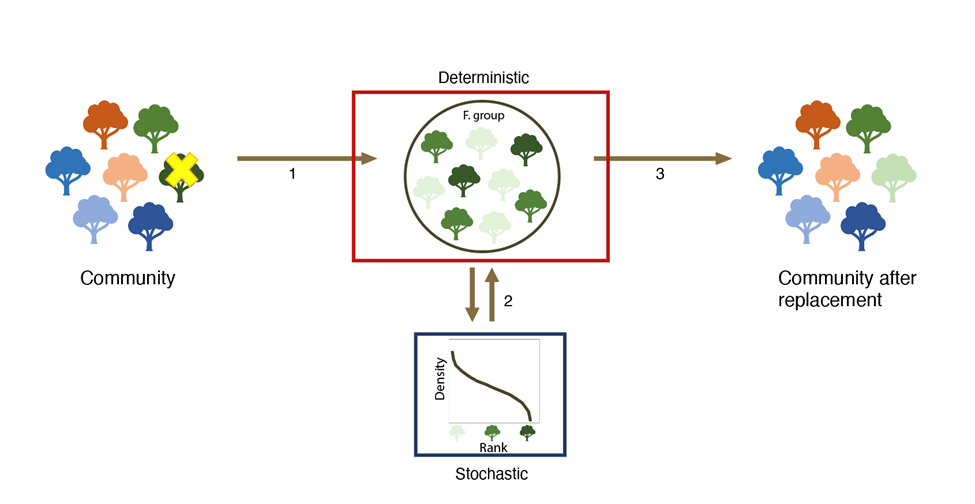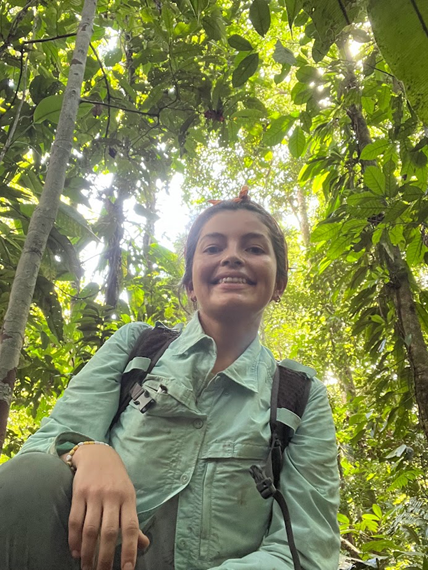Throughout April, we are featuring the articles shortlisted for the 2022 Harper Prize. The Harper Prize is an annual award for the best early career research paper published in Journal of Ecology. Vanessa Rubio Ramos’s article ‘Functional groups, determinism and the dynamics of a tropical forest‘ is one of those shortlisted for the award.
👋 About me
I grew up in Colombia, having an early fascination for nature. Most of my memories are filled with several small field trips my mother led. These early interactions with plants and animals shaped my curiosity and interest in science and forests. As a result, I started a double bachelor program at Universidad de los Andes in Colombia to pursue a BS in Environmental Engineering and a BS in Biology. During my studies, I had the opportunity to participate in long-term vegetation censuses and scientific discussions led by Dr. Pablo Stevenson and Dr. Ana Aldana. Later, I joined researchers at the Smithsonian Tropical Research Institute (STRI), where I was fortunate to meet and learn from a diverse group of scientists. While at STRI, as an REU student, I worked with seedlings and functional traits along a rainfall gradient. Later, I did an internship in which I spent most of my time understanding the spatiotemporal variability of soil respiration in Barro Colorado Island, supervised by Dr. Matteo Detto.
After these experiences in tropical forests, I knew I wanted to pursue a Ph.D. in tropical plant ecology. In 2017, I started my doctorate studies under the supervision of Dr. Nathan Swenson. During my Ph.D., I was fortunate enough to have some amazing conversations and collaborations with my advisor and colleagues in the lab, that improved my thinking and helped shape my career path. Most of my research has been centered around understanding the role of stochastic and deterministic processes in assembling tropical plant communities. Understanding how these processes shape plant communities, promote coexistence, and interact at different organizational levels are relevant, especially for highly diverse communities.
🔎 About the shortlisted paper
In the shortlisted study in the Journal of Ecology, we explored the functional group version of the neutral theory suggested by Robin Foster and Stephen Hubbell more than 30 years ago, but that has remained poorly understood and is not well-integrated in tree community ecology. In this theory, deterministic processes are expected to occur at the functional group level, while neutral processes are expected to occur at the species level in tropical rainforests.
We empirically demonstrated that the functional structure and turnover of an undisturbed tropical forest could be recovered by implementing this functional group-based version of the neutral theory. Specifically, we utilized empirical forest dynamics data, functional trait data, and simulation modeling to quantify when and how the observed dynamics deviate from that expected by a group-based neutral version. Determinism was found to operate at the functional group level, while neutrality was at the species level within groups. Moreover, the functional group habitat associations found suggest that habitat partitioning reflects the interplay between convergent multitrait strategies and the environmental conditions of each specific habitat.
Ultimately, the results show that functionally similar species within groups likely replace each other in a random manner through time. These results highlight the importance of deterministic and neutral processes during the assembly of communities by understanding the important role of functionally similar species grouped into functional groups. Specifically, a continuum between these processes is essential to maintaining forest species richness and functionality.

🌿 My current research
Following this research, I have been exploring the integration of other processes into this functional group version of the neutral theory. My current work implements process-based simulations to understand the implications of different processes in shaping the fundamental patterns we observe in plant communities. Moreover, I have been working on understanding the consequences of grouping species into functional groups by considering the interspecific trait variation of species within functional groups and the intraspecific trait variation of individuals of those species. This ongoing project resulted from my field trips to the Amacayacu National Natural Park in the Colombian Amazon.
Find Vanessa on Twitter and GoogleScholar.
Read the full list of articles shortlisted for the 2022 Harper Prize here.
